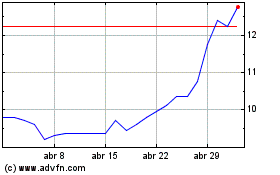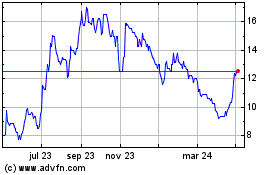TIDMRBW
Rainbow Rare Earths Limited
01 December 2021
1(st) December 2021
Rainbow Rare Earths Limited
("Rainbow" or "the Company")
LSE: RBW
COP26 Resolutions - a bright future for Rainbow Rare Earths
The 2021 United Nations Climate Change Conference of Parties
('COP26') recently closed with the adoption - by consensus of
nearly 200 countries - of the Glasgow Pact, which seeks to increase
climate ambition and action by keeping the target of 1.5C alive, as
well as finalising the outstanding elements of the Paris
Agreement.
Importantly, the deal struck has codified new rules to reduce
greenhouse gas emissions, including the gradual phasing down of
fossil fuel consumption and the reduction of the global carbon
market. Key to achieving this will be the advancement of the green
revolution, which aims to massively curtail the use of Internal
Combustion Engines ('ICE') and facilitate the greater utilisation
of renewable energies and widespread adoption of green technology.
These low-carbon greener technologies, however, have an intensive
mineral demand.
The Importance of High-Strength Permanent Magnets
Central to this demand are Rare Earth Elements ('REE') - in
particular, Neodymium and Praseodymium ('NdPr') and Dysprosium
('Dy'), which are used to make compact high-strength permanent
magnets used in the motors of hybrid and Electric Vehicles ('EVs')
and wind turbines powering the greener electrification era for the
international community. These permanent magnets are also used in
aerospace and the defence industries' satellite technology, and,
across their varied sector uses, directly impact between US$5
trillion to US$10 trillion in global GDP. As a result, with the
projected demand for REE expected to increase as much as ten times
between 2030 and 2040, they have been designated as critical and
strategic metals by the US Federal Department of the Interior, the
Government of China, and the EU Parliament, as they promote a drive
toward greater raw material security and sustainability.
To put this into a local UK context, in their letter to the
Committee on Climate Change, leading UK scientists noted that, in
order to replace all UK-based vehicles with EVs, at least 7,200
tonnes of neodymium and dysprosium would be needed, requiring a 70%
increase in annual production. ([1])
While rare earths are not rare from a geological perspective,
they are not commonly found in economically viable concentrations,
and, in addition to being generally low grade, often have high
levels of radioactivity owing to the presence of thorium, which
increases processing requirements and heightens safety concerns
both operationally and environmentally. Furthermore, 85% of the
world's REEs are currently produced by China, which has a
significant impact on global supply and demand dynamics.
RRE - The Phalaborwa Project
With its exciting project-in-development in South Africa,
Rainbow Rare Earths is well positioned to meet the anticipated
demand and supply gap. In particular, the high grade and low-cost
nature of the Phalaborwa Project, coupled with its anticipated
utilisation of the latest, state-of-the-art processing technology,
sets Rainbow well apart from its peers in its value and
environmental proposition. Rainbow has the near-term opportunity to
develop an independent, western Rare Earths supply chain and become
a significant, responsible producer of NdPr, with regulatory
oversight.
Rainbow Rare Earths CEO, George Bennett, commented:
"The resolution that follows the discussions of COP26 and the
affirmation of the Paris Agreement six years in the making to
adhere to net-zero carbon emissions, is a crucial factor in the
dramatic increase of sustainable forms of energy production.
Rainbow Rare Earths is in a pivotal position to provide the
foundational materials required to advance this clean technology
and the green revolution.
"The Phalaborwa Project can be brought into production quickly,
with low capital and operating expenditure, in an environmentally
responsible manner to deliver a high-grade oxide. In the processing
of material from the existing gypsum stacks at Phalaborwa, we aim
to deliver a clean rare earths project, removing environmental
liability and redepositing benign gypsum on a new stack, built
according to International Finance Corporation ("IFC") Performance
Standards and Equator Principles.
"The codification of international net-zero carbon targets
cements Rainbow's position as company working towards a green
future, directly contributing to the alleviation of climate change
through a responsible, sustainable, and independent supply chain
for Rare Earth Elements."
**ENDS**
For further information, please contact:
Rainbow Rare Earths George Bennett
Ltd Company Pete Gardner +27 82 652 8526
SP Angel Corporate Ewan Leggat
Finance LLP Broker Charlie Bouverat +44 (0) 20 3470 0470
Flagstaff Strategic Tim Thompson +44 (0) 207 129 1474
and Investor Communications Fergus Mellon rainbowrareearths@flagstaffcomms.com
Notes to Editors:
Rainbow's strategy is to become a globally significant producer
of rare earth metals. Nd/Pr are vital components of the strongest
permanent magnets used for the motors and turbines driving the
green technology revolution. Analysts are predicting demand for
magnet rare earth oxides will grow substantially over the coming
years, driven by increasing adoption of green technology, pushing
the overall market for Nd/Pr into deficit.
The Phalaborwa Rare Earths Project, located in South Africa,
comprises an Inferred Mineral Resource Estimate of 38.3Mt at 0.43%
total rare earths oxides ("TREO") contained within gypsum tailings
stacked in unconsolidated dumps derived from historic phosphate
hard rock mining. High value Nd/Pr oxide represent 29.1% of the
total contained rare earth oxides, with economic Dysprosium and
Terbium oxide credits enhancing the overall value of the rare earth
basket contained in the stacks. The rare earths are contained in
chemical form in the gypsum dumps, which is expected to deliver a
higher-value rare earth carbonate, with lower operating costs than
a typical rare earth mineral project.
The Company's Gakara Project in Burundi has produced one of the
highest-grade concentrates in the world (typically 54% TREO)
through trial mining operations. The Gakara basket is weighted
heavily towards Nd/Pr, which account for over approximately 19.5%
of the contained TREO and 85% of the value of the concentrate.
[1] Source:
https://www.nhm.ac.uk/press-office/press-releases/leading-scientists-set-out-resource-challenge-of-meeting-net-zer.html
This information is provided by Reach, the non-regulatory press
release distribution service of RNS, part of the London Stock
Exchange. Terms and conditions relating to the use and distribution
of this information may apply. For further information, please
contact rns@lseg.com or visit www.rns.com.
Reach is a non-regulatory news service. By using this service an
issuer is confirming that the information contained within this
announcement is of a non-regulatory nature. Reach announcements are
identified with an orange label and the word "Reach" in the source
column of the News Explorer pages of London Stock Exchange's
website so that they are distinguished from the RNS UK regulatory
service. Other vendors subscribing for Reach press releases may use
a different method to distinguish Reach announcements from UK
regulatory news.
RNS may use your IP address to confirm compliance with the terms
and conditions, to analyse how you engage with the information
contained in this communication, and to share such analysis on an
anonymised basis with others as part of our commercial services.
For further information about how RNS and the London Stock Exchange
use the personal data you provide us, please see our Privacy
Policy.
END
NRAFZMFMGGMGMZZ
(END) Dow Jones Newswires
December 01, 2021 02:00 ET (07:00 GMT)
Rainbow Rare Earths (LSE:RBW)
Gráfica de Acción Histórica
De Mar 2024 a Abr 2024

Rainbow Rare Earths (LSE:RBW)
Gráfica de Acción Histórica
De Abr 2023 a Abr 2024
